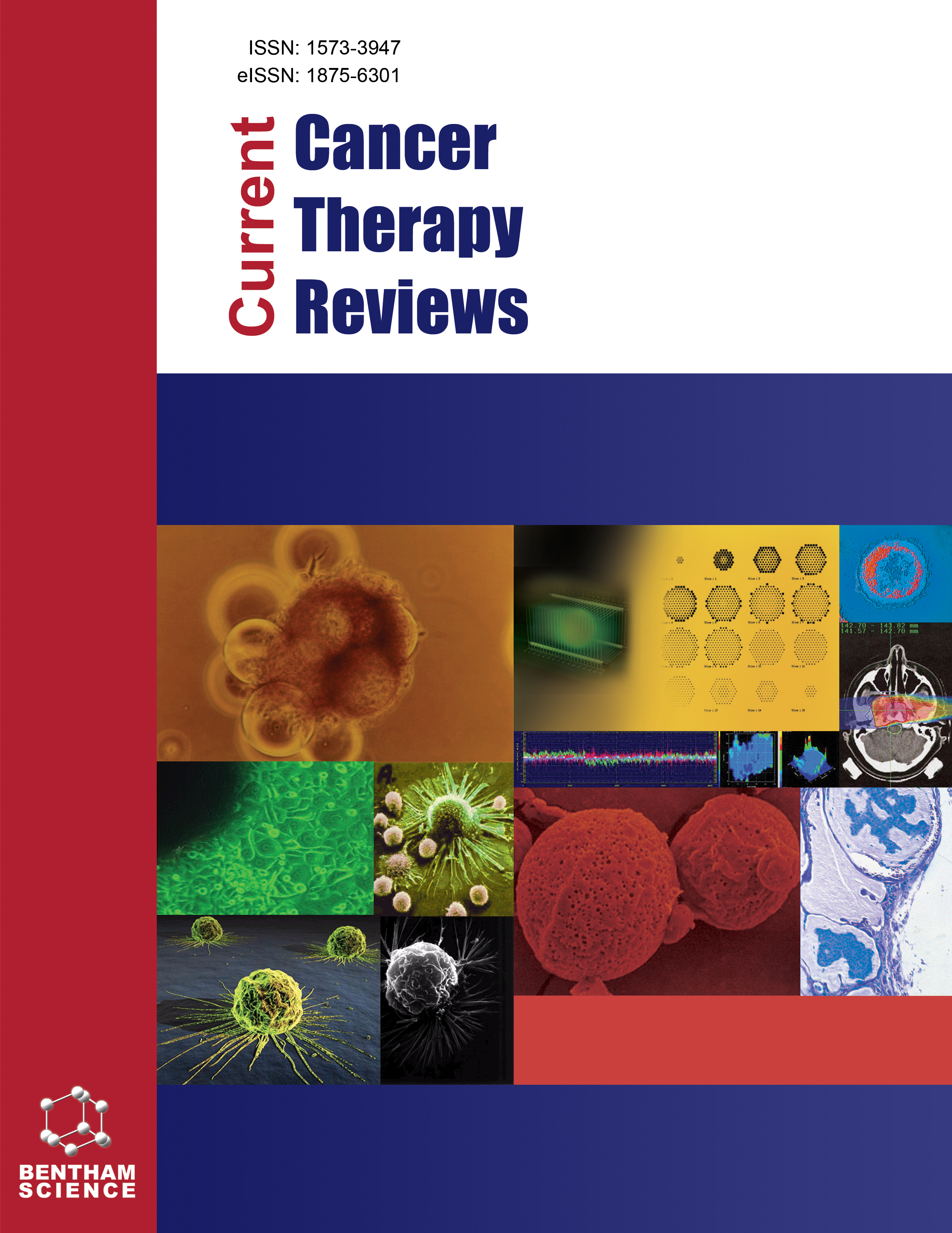- Home
- A-Z Publications
- Current Cancer Therapy Reviews
- Previous Issues
- Volume 3, Issue 4, 2007
Current Cancer Therapy Reviews - Volume 3, Issue 4, 2007
Volume 3, Issue 4, 2007
-
-
Editorial [ The Role of Epidermal Growth Factor Receptor (EGFR) Targeting Drugs in the Treatment of Cancer Guest Editor: Fortunato Ciardiello ]
More LessAuthors: Fortunato Ciardiello and Giampaolo TortoraGrowth factors are locally secreted peptide hormones that are involved in regulating cell proliferation, differentiation and survival by binding to and by activating specific cell membrane receptors on target cells. The epidermal growth factor (EGF) is the first discovered growth factor within a family of related proteins (EGF-like growth factors), which includes transforming growth factor ?? (TGF??), amphiregulin, heparin binding Read More
-
-
-
Small Molecule Epidermal Growth Factor Receptor (EGFR) Tyrosine Kinase Inhibitors in Non Small Cell Lung Cancer Treatment
More LessThe epidermal growth factor receptor (EGFR) is a cellular transmembrane receptor with tyrosine kinase enzymatic activity which plays a key role in human cancer. EGFR-dependent signaling is involved in cancer cell proliferation, apoptosis, angiogenesis, invasion and metastasis. Targeting the EGFR has played a central role in advancing non small cell lung cancer (NSCLC) research, treatment and patients outcome over the last Read More
-
-
-
Vandetanib, A Dual Inhibitor of VEGFR and EGFR Tyrosine Kinase Activity
More LessAuthors: Teresa Troiani, Tina Cascone, John Heymach and Fortunato CiardielloAngiogenesis, the formation of new blood vessels from the endothelium of the existing vasculature, is fundamental to support tumor growth. Inhibiting tumor angiogenesis is a promising strategy for treatment of cancer and has been successfully transferred from preclinical to clinical application in recent years. Due to its role in tumor angiogenesis, the vascular endothelial growth factor (VEGF) and its receptor have be Read More
-
-
-
Cetuximab, A Chimeric Anti-Epidermal Growth Factor Receptor Monoclonal Antibody, in Colorectal Cancer Treatment
More LessColorectal cancer (CRC) is the fourth most common malignant disease. Of newly diagnosed patients, 40% have metastatic disease at diagnosis, and approximately 25% of patients with localized disease at diagnosis will ultimately develop metastatic disease. The benefits of systemic chemotherapy in the treatment of metastatic colorectal cancer over best supportive care have been established. The epidermal growth Read More
-
-
-
Epidermal Growth Factor Receptor-Targeted Therapy of Colorectal Cancer with Panitumumab
More LessPanitumumab is a fully human monoclonal antibody directed against the epidermal growth factor receptor (EGFR), which when overexpressed may contribute to the development and progression of cancer and is present in several solid tumors, including colorectal cancer (CRC). Panitumumab is registered in USA for the treatment of patients with EGFR expressing CRC after disease progression on or following fluoropyrimidine-, ox Read More
-
-
-
EGFR Inhibitors and Radiation in HNSCC
More LessAuthors: Laura Q. Chow, Changhu Chen and David RabenEpidermal growth factor receptor (EGFR) signalling has previously been identified as an important prognostic factor in patients with head and neck cancer (HNC). EGFR has been confirmed in a phase III randomized trial as a critical target in combination with radiation therapy for locally advanced HNC patients. Provocatively, the outcomes, at first glance, appear similar to patients treated with conventional chemo-radiati Read More
-
-
-
Optimizing Anti-EGFR Strategies in Cancer Treatment
More LessMolecules interfering with the Epidermal Growth Factor Receptor (EGFR) have been successfully tested in several human malignancies in the last decade, including non-small cell lung cancer, colo-rectal, pancreatic and head and neck cancer. Particularly, the two most commonly used strategies for blocking EGFR include tyrosine-kinase inhibitors (TKIs) targeting the intracellular domain of the receptor and monoclonal a Read More
-
-
-
Mechanisms of Intrinsic and Acquired Resistance to EGFR Inhibitors
More LessAuthors: Floriana Morgillo, Giampaolo Tortora and Fortunato CiardielloIn the last decades the epidermal growth factor receptor (EGFR), which is frequently expressed in a variety of epithelial tumors, has been a major target of molecular anticancer therapy.
-
-
-
Combination of Anti-EGFR Drugs with Anti-Angiogenic or Other Signal Transduction Inhibitors as a Rational Approach to Cancer Therapy
More LessAuthors: Maria P. Morelli, Jennifer Spratlin and S. Gail EckhardtActivation of the epidermal growth factor receptor (EGFR)-dependent intracellular signaling pathway has a relevant role in the development and the progression of several human cancers. However, EGFR-targeted therapies have a significant clinical activity only in a subgroup of cancer patients whose tumors express the EGFR. This is due in part to the activation of several other signal transduction pathways which will be Read More
-
-
-
Methodological Issues of Clinical Research with EGFR Inhibitors
More LessThe epidermal growth factor receptor (EGFR) signaling plays a key role in tumorigenesis and it has been considered an attractive target for novel antitumoral agents. Small-molecule tyrosine kinase inhibitors such as gefitinib and erlotinib have been approved for the treatment of advanced non-small-cell lung cancer (NSCLC) patients. However, the positive results obtained in early clinical trials with gefitinib were not confirme Read More
-
Volumes & issues
-
Volume 21 (2025)
-
Volume 20 (2024)
-
Volume 19 (2023)
-
Volume 18 (2022)
-
Volume 17 (2021)
-
Volume 16 (2020)
-
Volume 15 (2019)
-
Volume 14 (2018)
-
Volume 13 (2017)
-
Volume 12 (2016)
-
Volume 11 (2015)
-
Volume 10 (2014)
-
Volume 9 (2013)
-
Volume 8 (2012)
-
Volume 7 (2011)
-
Volume 6 (2010)
-
Volume 5 (2009)
-
Volume 4 (2008)
-
Volume 3 (2007)
-
Volume 2 (2006)
-
Volume 1 (2005)
Most Read This Month
Article
content/journals/cctr
Journal
10
5
false
en


